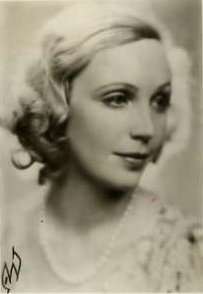Inga Tidblad
Inga Sofia Tidblad (29 May 1901 – 12 September 1975) was a Swedish actress. She was one of the most praised actresses in Swedish theatre during her lifetime.
Inga Tidblad | |
|---|---|
 Inga Tidblad in the 1930s. | |
| Born | Inga Sofia Tidblad 29 May 1901 |
| Died | 12 September 1975 (aged 74) Stockholm, Sweden |
| Nationality | Swedish |
| Occupation | Actress |
| Years active | 1921–1974 |
| Spouse(s) | Ragnar Billberg
( m. 1923; died 1930) |
| Children | Lena Billberg (1926–1997) Meg Westergren (born 1932) Claes-Håkan Westergren (born 1935) |
Biography
Tidblad grew up in Stockholm as daughter to engineer Otto Tidblad and the formerly Helga Krumlinde. She was a student at the Royal Dramatic Theatre's famous acting school, Dramatens elevskola 1919–22, where she during her student years already was recognized as a rising star by audience and critics for her debut performance of Ariel in Shakespeare's The Tempest, where director Olof Molander had hand-picked her for the part, early recognizing her talent. After her graduation from drama school she worked at the Swedish Theatre, where she had her big star breakthrough in Sweden as Ophelia in Hamlet, opposite Schanke in the title role, in 1924. She remained in the theatre's ensemble until its tragic burn-down in 1925.
Most notable for her many female leads in Shakespeare and Strindberg plays, star performances by Tidblad on stage include her Ophelia in Shakespeare's Hamlet, Billie Moore in Broadway, the Angel in Cenodoxus, Aude in Graven under triumfbågen, Anna Boleyn in Henry VIII, Juliet in Shakespeare's Romeo and Juliet, Ellen in Älskling jag ger mig, Rosalind in Shakespeare's As You Like It, Lotta Enterfelt in Svenska sprätthöken, Alegre in Maxwell Anderson's play Key Largo 1940, Sonja in Crime and Punishment, Blanche in Folkungasagan, Portia in Shakespeare's Julius Caesar, Mary Vetsera in Mayerlingdramat, Cecilia in Rovdjuret, The Daughter in Strindberg's The Ghost Sonata, Mrs. Kenyon in Samson Raphaelson's play Skylark 1943, Beréngère in Robert Boissy's Jupiter 1943, Marguerite Gautier in Alexandre Dumas' The Lady of the Camellias 1954, Mary Tyrone in the world premiere of Eugene O'Neill's Long Day's Journey Into Night 1956, in Terence Rattigan's Separate Tables at Vasateatern 1958-59 and as Queen Christina in August Strindberg's play Kristina in 1961.
During her career Tidblad performed at Sweden's prime theatres; after her work at the Swedish Theatre she worked at the Vasateatern 1925-26, the Oscarsteatern 1926-32 and at the Royal Dramatic Theatre (Dramaten) from 1932 to 1963 when she retired from stage. After her retirement she made only a few guest appearances on stage and film.
She starred in some notable early Swedish silent films, including Norrtullsligan 1923, Mälarpirater 1923, Farbror Frans 1926 and Svarte Rudolf 1928. She made her film debut in Andersson, Pettersson och Lundström in 1923. In 1930 she starred in the lead, opposite Gösta Ekman, in the first Swedish talkie; For Her Sake. Notable performances on film include Norrtullsligan (1923), Sången om den eldröda blomman (1934), Intermezzo (the original Swedish 1936 film), Flames in the Dark (1942), Det brinner en eld (1943), Den osynliga muren (1944), Frånskild aka Divorced (1951; directed by Gustaf Molander and written by Ingmar Bergman), Kvinnohuset (1953), Enhörningen (1955), Pärlemor (1961); and Pistolen (1973), for which Tidblad was awarded a Guldbagge Award (the finest Swedish film award, the Golden Beetle) for Best Actress, shortly before her death.
She was also the voice of Pinocchio in the Swedish dubbing of Walt Disney's film Pinocchio (1940) and also guest-starred in an episode of the early American TV series Foreign Intrigue in 1956. Was awarded the Eugene O'Neill Award in 1956 and a Guldbagge Award for Best Actress in 1974 for her role in Pistol.[1]
She was married first to actor Ragnar Billberg (1923–1930) and then to actor Håkan Westergren from 1931 (to her death in 1975), with whom she had daughter Meg Westergren and son Claes-Håkan Westergren, also actors.
Selected filmography
- Andersson, Pettersson och Lundström (1923)
- Mälarpirater (1923)
- Norrtullsligan (1923)
- Grevarna på Svansta (1924)
- Ödets man (1924)
- Farbror Frans (1926)
- Svarte Rudolf (1928)
- For Her Sake (1930)
- Längtan till havet (1930)
- Hälsingar (1933)
- Hon eller ingen (1934)
- Sången om den eldröda blomman (1934)
- Intermezzo (1936)
- Janssons frestelse (1938)
- Flames in the Dark (1942)
- Det brinner en eld (1943)
- Den osynliga muren (1944)
- Kungajakt (1944)
- Galgmannen (1945)
- Frånskild (aka Divorced) (1951)
- Kvinnohuset (1953)
- Gabrielle (1954)
- Enhörningen (aka The Unicorn) (1955)
- Foreign Intrigue, TV series (1956)
- Pärlemor (1961)
- Ateljé Mia (1965)
- Glasmenageriet (The Glass Menagerie), TV theatre (1967)
- Drottningens juvelsmycke, mini series (1967)
- Pistolen (1973)
- Gangsterfilmen (1974)
References
- "Pistolen (1973)". The Swedish Film Database. Retrieved 2014-03-04.